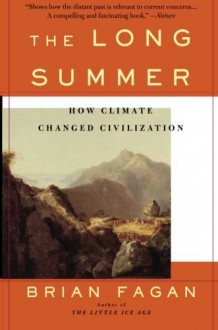The Long Summer: How Climate Changed Civilization
Humanity evolved in an Ice Age in which glaciers covered much of the world. But starting about 15,000 years ago, temperatures began to climb. Civilization and all of recorded history occurred in this warm period, the era known as the Holocene-the long summer of the human species. In The Long...
show more
Humanity evolved in an Ice Age in which glaciers covered much of the world. But starting about 15,000 years ago, temperatures began to climb. Civilization and all of recorded history occurred in this warm period, the era known as the Holocene-the long summer of the human species. In The Long Summer, Brian Fagan brings us the first detailed record of climate change during these 15,000 years of warming, and shows how this climate change gave rise to civilization. A thousand-year chill led people in the Near East to take up the cultivation of plant foods; a catastrophic flood drove settlers to inhabit Europe; the drying of the Sahara forced its inhabitants to live along the banks of the Nile; and increased rainfall in East Africa provoked the bubonic plague. The Long Summer illuminates for the first time the centuries-long pattern of human adaptation to the demands and challenges of an ever-changing climate-challenges that are still with us today.
show less
Format: paperback
ISBN:
9780465022823 (0465022820)
Publish date: December 29th 2004
Publisher: Basic Books
Pages no: 304
Edition language: English

This is an interesting survey of the impact of climate change on man in the last 18,000 or so years (since the last ice age). Fagan knows his material, as he is a distinguished anthropologist. However, in reading the material on effects of climate change in the historical era, I think he sometime...






 12 years ago
12 years ago